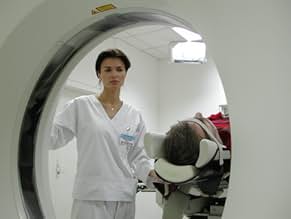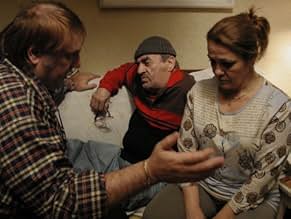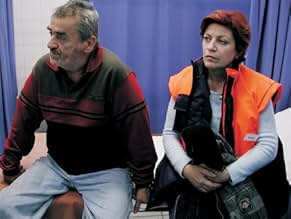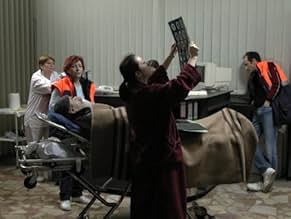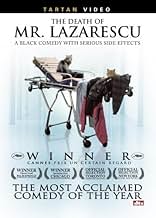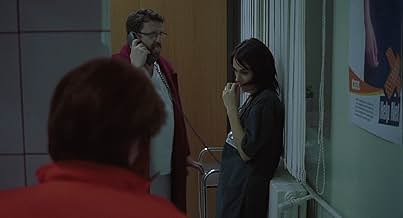Mr. Lãzãrescu, a dying old man, is shuttled from hospital to hospital by a loyal paramedic as doctors refuse to operate and no one can agree on a diagnosis.Mr. Lãzãrescu, a dying old man, is shuttled from hospital to hospital by a loyal paramedic as doctors refuse to operate and no one can agree on a diagnosis.Mr. Lãzãrescu, a dying old man, is shuttled from hospital to hospital by a loyal paramedic as doctors refuse to operate and no one can agree on a diagnosis.
- Director
- Writers
- Stars
- Awards
- 30 wins & 14 nominations total
- Ambulantier
- (as Doru Boguta)
- Mr. Lazarescu (Domnui Lazarescu)
- (as Ioan Fiscuteanu)
- Director
- Writers
- All cast & crew
- Production, box office & more at IMDbPro
Featured reviews
There are three levels one can see Puiu's film. The first is the relation between the single human and the medical system. 'Moartea domnului Lazarescu' is the anti-'ER' with the universal character of the paternal doctor, playing God just to hide his own lack of competence and his indifference is kind of universal.
Then we have the story of Dante (yes!) Lazarescu descending in five hours the spiral stairs between being a pauper drunken in today's Bucharest towards almost certain physical death. An yet, despite the gradual physical degradation admirably acted by Ion Fiscuteanu, Mr. Lazarescu keeps intact his moral and human dignity, even as he slowly slides into a comma.
I am not sure whether folks who did not live in Romania or other former communist countries will catch easily the third layer. Lazarescu lives in a world in decomposition. Dictature is gone, but no social help system replaced it, his family is far away, his neighbors are simple people, indifferent and hardly coping with their own problem. Yet, in this decrepit medium he will find in the assistant Mioara a caring person, who will not only try to save him, but will ease his last hours with the feeling that yet there is somebody who cared for him. It's not quality of life, it's more - quality of humanity.
Puiu was inspired at nineteen by Jim Jarmusch's "Stanger Than Paradise" to become a filmmaker. He says "ER" is syndicated in Rumania: "When you watch the American show, there's movement in every direction, the choreography of the characters is amazing -- but I can't believe any of it." In "Mr. Lazarescu" Puiu does an "ER," Rumanian style. There's movement in only one direction -- following sixty-something Lazarescu, a drinker with a sore belly and a terrible headache, on a Saturday night in Bucharest when there has been a bad bus accident, after he calls 911. Puiu throws out hints of profundity with names in the script like Lazarus, Virgil, Dante, Remus, and Angel; and the trek from hospital to hospital as Lazarescu's diagnosis changes and his condition worsens can be seen as a journey through Hell. But the film didn't win the Un Certain Regard top prize at Cannes this year because of any message. It's Puiu's attention to detail, the precise planning of dialog and camera positions that gives a sense of documentary accuracy to the action and makes the film compulsively watchable and somehow unique and yet universal.
A splendid movie. Probably one of the top five selections of the New York Film Festival. There is much that can be said about it but really only one thing need be said: see it as soon as you can. Watch for a DVD release.
Puiu's movie, inspired from true events (some years ago, a man was transported from one hospital to the other with a most tragic consequence) follows its protagonist through the final stages of his life: feeling ill, Lazarescu calls for an ambulance and awaits its (delayed) arrival drinking and making telephone calls. As the hands of the clock turn and the ambulance is nowhere to be heard or seen, the old man goes next door, trying to get some help from the neighbors: a stereotype of their kind. Once the ambulance finally arrives, Lazarescu embarks on a most dreadful road trip, from hospital to hospital, in an elaborate attempt to diagnose and operate him. The story begins.
It would be unfair not to acknowledge the film's authenticity from the outset. Truly segmented - as the director himself affirmed, regarding "Lazarescu" as the first in six stories about the Romanian capital - in several (short) "stories of Bucharest", we meet most intriguing characters and situations, each of them highly rewarding on different levels. Good doctors, bad doctors, grumpy doctors, snobbish doctors, pitiful doctors - all the guys and girls our great medical system can offer. Still, some continue to resemble human beings, which - to a certain degree - is quite an achievement.
The bad light Puiu sheds on them may be diminished by the fact that the night Lazarescu chose to fall ill was most unfortunate: a terrible car accident filled most of the hospitals so that it was extremely difficult to find a place for an old, drunk man who was automatically labeled as a drinker and treated as such. Few characters in the film show authentic sympathy for Lazarescu, as most of them just want to get on with the job and do themselves a greater good. There is no such concept of readiness to help a fellow man struggling between life and death: commodity reigns. Unlike Lazarus, our main character will most probably not rise from the dead. And the people who still stand and didn't give their everything are up to their throats in guilt.
But this is the terrible, depressing half of the story. A most regretful reality. Cristi Puiu's and Razvan Radulescu's (a bit overlong) script is at times filled with moments of sheer irony, sarcasm and cynicism, all worth their laughs. Some of these moments are brilliant. Lazarescu is witty and gutsy, as long as he can talk. He is a man who - despite what others think - wants to stand up for himself and would rather not let anyone treat him like scum. Sadly, though, all is part of a gigantic vicious circle: doctors remain people and patients are not at all different. Flawed. Yet, there is a question of humanity and dignity involved. A choice between what is right and what is easy, as the saying goes.
A few years ago, my family called the ambulance for one of our relatives. He was having vague back pain -- we couldn't get him to communicate with us about it. He didn't want to go to the hospital, but his pain was too great for him not to. He is an alcoholic, and to this day lives under the assumption that none of us know he's an alcoholic, so I think his fear of the hospital had somewhat to do with the fear that his "secret" would be exposed. We ended up in a living hell of smug doctors, each with a different diagnosis of his condition, but who were all in agreement that the patient should be treated like dirt because of his addiction. If he wasn't going to care about his own health, they seemed to think, then why should they?
So needless to say, despite the fact that it takes place in Romania, "The Death of Mr. Lazarescu" hit frightfully close to home for me, as it's about a lonely, alcoholic man and his nighttime trip into the purgatory of emergency-room bureaucracy. The foreign setting aside, this film could have taken place in the USA and been no different. Nobody has time for Mr. Lazarescu, everyone has a different theory as to what is wrong with him, the nurses are more interested in making sure paperwork is filled out than they are in taking care of the living, breathing human being suffering -- and perhaps dying -- on the stretcher in front of them. In one scene, the doctors insult and belittle the ambulance nurse when she tries to offer her own assessment of Mr. Lazarescu's condition, holding their advanced schooling over and against her. We don't learn much about Mr. Lazarescu, and so we see events occur from the perspective of this paramedic who takes charge of him and carts him from one hospital to the next in a desperate attempt to find one that will treat him. To her, Mr. Lazarescu is a job, yet she's the closest thing to a caring relative he has, so cold and indifferent is the rest of the health care world.
This film is astonishing in its meticulous detail, and it's hard to believe it's not a documentary, something out of the world of Fredrick Wiseman. Most scenes are filmed in long takes, the camera standing back at an objective distance simply capturing the whirl of human activity taking place around it. The acting is amazing, for the very reason that no one seems to be acting. It's a deeply unsettling film; we know Mr. Lazarescu will likely die -- from cancer if not from the surgery he's about to undergo when the film closes, and anyway, the title tells us as much. But we don't see him die in the film -- the last scene is of him being washed, shaved and dressed for surgery, a human being reduced to a slab of living flesh on a table, robbed of even his last shred of dignity, while no one appears to care. Somehow, that lack of closure is one of the most unsettling things in the film; it captures the feeling one has when you've finally gotten your loved one to the hospital and all you can do is wait, not sure whether or not you're going to see him alive again.
Grade: A
Did you know
- TriviaThe film was shot in 39 nights in real hospitals. It was edited in 38 days.
- Quotes
Mr. Lazarescu (Domnui Lazarescu): Excuse me, Nurse, but how old are you?
Mioara Avram: I'm not that young anymore. I'm 55.
Mr. Lazarescu (Domnui Lazarescu): 55?
Mioara Avram: Yes. In September.
Mr. Lazarescu (Domnui Lazarescu): In September? Just like Virgil, my brother-in-law, only he's 68.
- ConnectionsFeatured in 2006 Independent Spirit Awards (2006)
- How long is The Death of Mr. Lazarescu?Powered by Alexa
Details
- Release date
- Country of origin
- Language
- Also known as
- La mort de Monsieur Lazarescu
- Filming locations
- Production company
- See more company credits at IMDbPro
Box office
- Budget
- $500,000 (estimated)
- Gross US & Canada
- $80,301
- Opening weekend US & Canada
- $5,880
- Apr 30, 2006
- Gross worldwide
- $216,922
- Runtime2 hours 33 minutes
- Color
- Sound mix
- Aspect ratio
- 1.85 : 1


